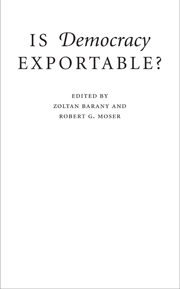Book contents
- Frontmatter
- Contents
- Contributors
- Acknowledgments
- Introduction
- A MORAL IMPERATIVE?
- STRUCTURAL PRECONDITIONS
- 2 Re-Integrating the Study of Civil Society and the State
- 3 Encountering Culture
- 4 Does Democracy Work in Deeply Divided Societies?
- 5 Democracy, Civil Society, and the Problem of Tolerance
- INSTITUTIONS AND PROCESSES
- Conclusion: Is Democracy Exportable?
- Bibliography
- Index
4 - Does Democracy Work in Deeply Divided Societies?
Published online by Cambridge University Press: 05 June 2012
- Frontmatter
- Contents
- Contributors
- Acknowledgments
- Introduction
- A MORAL IMPERATIVE?
- STRUCTURAL PRECONDITIONS
- 2 Re-Integrating the Study of Civil Society and the State
- 3 Encountering Culture
- 4 Does Democracy Work in Deeply Divided Societies?
- 5 Democracy, Civil Society, and the Problem of Tolerance
- INSTITUTIONS AND PROCESSES
- Conclusion: Is Democracy Exportable?
- Bibliography
- Index
Summary
The sad fate of recent political reforms pushed on the Middle East and on some African countries should make all of us skeptical about the value of blanket recommendations to promote democracy as a universal solution to the problems of autocratic and corrupt regimes. As the cases of Iraq and Lebanon in the early 2000s have demonstrated, if ethno-religious communities that compete with each other place their own values, interests, and loyalties above those of a theoretical national welfare, then stable democracy is impossible. This is all the more so if such competition is viewed as being zero-sum, with gains by any community necessarily resulting in equal losses by the others.
THE PROBLEM OF DIVIDED BUT STRONG COMMUNAL, CULTURALLY BASED IDENTITIES
In a prescient comment made at a time when it seemed that deep religious conflicts were less important than they had been in the past, Milton Friedman wrote, “Fundamental differences in basic values can seldom if ever be resolved at the ballot box; ultimately they can only be decided, though not resolved, by conflict. The religious and civil wars of history are a bloody testament to this judgment” (Friedman 2002: 24). Friedman concludes from this that extending market relations into as many areas of social life as possible and away from politics is the best way to avoid such conflicts. Coming from a noted economist, this is not surprising.
- Type
- Chapter
- Information
- Is Democracy Exportable? , pp. 85 - 109Publisher: Cambridge University PressPrint publication year: 2009
- 4
- Cited by

